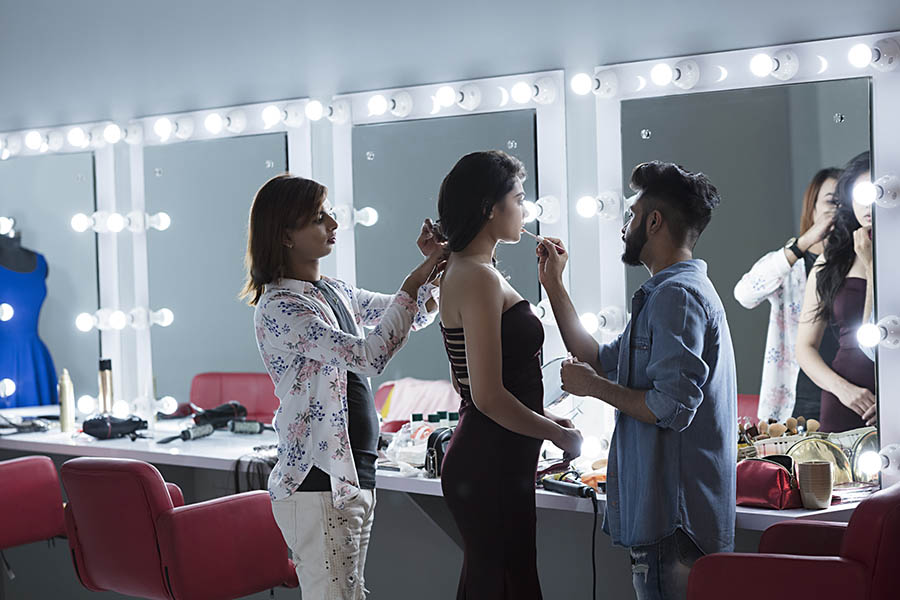HOW IT WORKS
Makeup Artists

- Professionals providing makeup application services for special events, photoshoots, or everyday looks.
Makeup artists are professionals who specialize in the application of cosmetics to enhance the beauty and appearance of individuals. They possess a deep understanding of color theory, skin types, and facial features, allowing them to create customized looks for various occasions such as weddings, photo shoots, fashion shows, and special events.
Key characteristics of makeup artists include creativity, attention to detail, excellent communication skills, and the ability to work with diverse clientele. Their target audience typically consists of individuals seeking professional makeup services for specific events or those looking to enhance their everyday appearance.
Common products and services offered by makeup artists include makeup application, bridal makeup, special effects makeup, airbrush makeup, and makeup lessons. They may also sell beauty products or collaborate with other professionals in the beauty industry.
Typical business models for makeup artists include freelancing, working in a salon or spa, collaborating with photographers or fashion designers, and providing on-site services for events. With the rise of social media and influencer culture, makeup artists often showcase their work online to attract clients and build their brand.
Notable trends and innovations within the makeup artist industry include the use of vegan and cruelty-free products, sustainable practices, and the integration of technology such as virtual makeup consultations and online booking systems. Makeup artists also play a crucial role in promoting diversity and inclusivity in the beauty industry by offering services for individuals of all skin tones and backgrounds.
The unique value proposition of makeup artists lies in their ability to enhance natural beauty, boost confidence, and create personalized looks that cater to the individual preferences of their clients. However, challenges in this industry may include intense competition, staying current with trends and techniques, managing a flexible schedule, and ensuring client satisfaction.
Overall, makeup artists play a vital role in the beauty industry by providing professional makeup services that empower individuals to look and feel their best for any occasion. Their expertise and creativity make them essential partners for achieving a flawless and personalized beauty look.
The operational cycle of a Makeup Artist business begins with identifying market opportunities and consumer needs in the beauty industry. This involves staying updated on current trends, understanding client preferences, and conducting market research to tailor services accordingly.
Once these demands are identified, the business formulates its makeup services to meet these needs, focusing on unique features such as personalized makeup techniques, use of high-quality products, and specialized expertise in different makeup styles. Emphasis is placed on providing value through enhancing clients’ natural beauty and boosting their confidence.
In terms of marketing and promotional strategies, the Makeup Artist business utilizes social media platforms, collaborations with influencers, participating in beauty events, and offering promotions to reach target audiences and generate interest. Building a strong online presence and showcasing before-and-after transformations are key components of these strategies.
When it comes to sales and distribution processes, the Makeup Artist business primarily relies on appointments booked through a website or social media platforms. Client interactions are personalized to ensure a comfortable and enjoyable experience, with a focus on understanding individual preferences and providing tailored recommendations.
Post-sale services are essential in maintaining customer satisfaction and loyalty. This includes follow-up communication, makeup touch-up sessions, and providing tips for makeup maintenance. Feedback is actively sought from clients to continuously improve services and adapt to changing market trends, ensuring a high level of customer satisfaction and loyalty in the long run.
In the realm of makeup artists, daily operations face challenges such as resource management (e.g. scheduling appointments, managing supplies), communication & collaboration (e.g. coordinating with clients and team members), process inefficiency (e.g. time-consuming makeup application techniques), inventory management (e.g. tracking and restocking products), quality control (e.g. ensuring consistent and high-quality results), technology integration (e.g. utilizing software for bookings and payments), data management (e.g. maintaining client information securely), and risk management (e.g. dealing with allergic reactions or client dissatisfaction). To overcome these challenges, makeup artists can implement efficient scheduling systems, communicate clearly with clients and colleagues, streamline makeup application processes, monitor and replenish inventory regularly, set high standards for service delivery, leverage technology for business operations, organize and protect client data, and establish protocols for handling risks and complaints effectively. By addressing these operational areas proactively, makeup artists can enhance their business performance and client satisfaction.
-
Webspad has truly transformed the way we manage our makeup artist business. With their user-friendly tools and tech expert support, we were able to streamline our operations seamlessly. One specific challenge we faced was inefficient scheduling and communication with clients. Webspad provided us with a comprehensive system that not only helped us schedule appointments more efficiently but also improved our client communication. As a result, our business saw a significant improvement in client satisfaction and overall productivity. We are grateful for the impact Webspad has had on our day-to-day operations.
Makeup Artists Merchant Tweet / X

